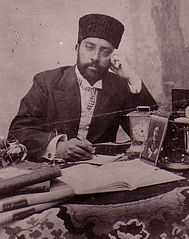Mahmud Tarzi
Mahmud Tarzi (* 1865 in Ghazni , Afghanistan , † November 22, 1933 in Istanbul , Persian طرزی محمود) was an Afghan intellectual . He is considered the "father of journalism" and a key figure of modernity in Afghanistan.
Life
Mahmud Tarzi was born in the city of Ghazni, Afghanistan, in 1865. His father Sardar Gholam Mohammad Tarzi was a well-known poet and the leader of the Mohammedzai . In 1881 the Tarzi family went into exile in Turkey during the reign of Abdur Rahman Khan . On a second trip to Damascus , Mahmud Tarzi married the daughter of Sheikh Saleh Al Mossadiah, a muezzin of the Amawia Mosque . Tarzi lived in Turkey until he was 35 years old. There he learned Dari , Pashto , Turkish , French , Arabic and Urdu . Emir Abdur Rahman Khan's successor Habibullah Khan asked the Tarzi family to return to Afghanistan.
Journalism and poetry
The travelogue Sayahat-Namah-e Manzum is one of Mahmud Tarzi's earliest works . He also founded the Serajal Akhbar newspaper , which appeared twice a week from October 1911 to January 1919 and played an important role in Afghan modernity . The newspaper also served as a forum for small Afghan groups and as an ethical justification for the principles of Afghan nationalism. Mahmud Tarzi also published the Seraj al Atfal newspaper, which was aimed at Afghan youth. Tarzi was also the first Afghan translator of English and French novels, as well as many other European works, such as Around the World in 80 Days , 20,000 Leagues Under the Sea , and The Mysterious Island and the Story of the Second Russo-Japanese War . Tarzi published alongside collections of essays, the book The Garden of Knowledge and the novel trip through three continents in 29 days (Travel Across Three Continents in Twenty-Nine Days).
politics
Mahmud Tarzi is considered an Afghan nationalist. He became Minister of Foreign Affairs under Emir Amanullah Khan . From 1922 to 1924 Tarzi was ambassador to France . During the reigns of Emir Habibullah Khan and Emir Amanullah Khan, Tarzi occupied important government positions. So he worked as an advisor and head of the Ministry of Foreign Affairs. Tarzi is a good example of the reforms in Afghan society at the beginning of the 20th century. He is considered to be the driving force behind Emir Habibullah Khan, who implemented social reforms, particularly in the field of education, which led to the modernization of schools, some of which were still medieval.
Ghobar writes in his book Afghanistan "Dar Masir e Tarikh" that Mahmud Tarzi and even King Ammanullah had lost sight of the reality in Afghanistan and could not distinguish Afghanistan from Turkey. The dream of a modern Afghanistan quickly failed because King Amanullah was not politically experienced enough. To make matters worse, M. Tarzi, the king's mentor, had lived outside Afghanistan for 35 years and was therefore not familiar with the conditions in the country.
Afghanistan's independence
Tarzi led the movement of the young Mashroota Khwah . This led to the resurrection of the first suppressed movement, with Tarzi serving as a senior advisor.
death
Many of Tarzi's plans were not implemented. After working with Emir Amanullah Khan, Tarzi and his family went back to Turkey, where he died on November 22, 1933 in Istanbul.
Web links
- Brief information page about Mahmud Tarzi
- Website about Mahmud Tarzi
- Photos by Mahmud Tarzi
- Link to the Mahmud Tarzi Cultural Foundation (MTCF)
- Works of Mahmud Beg Tarzi, The Precursor of Reform in Afghanistan
| personal data | |
|---|---|
| SURNAME | Tarzi, Mahmud |
| BRIEF DESCRIPTION | Afghan intellectual and diplomat |
| DATE OF BIRTH | 1865 |
| PLACE OF BIRTH | Ghazni |
| DATE OF DEATH | November 22, 1933 |
| Place of death | Istanbul |

